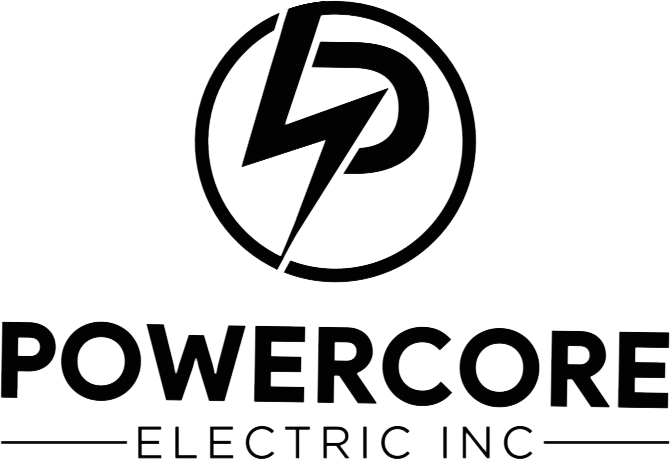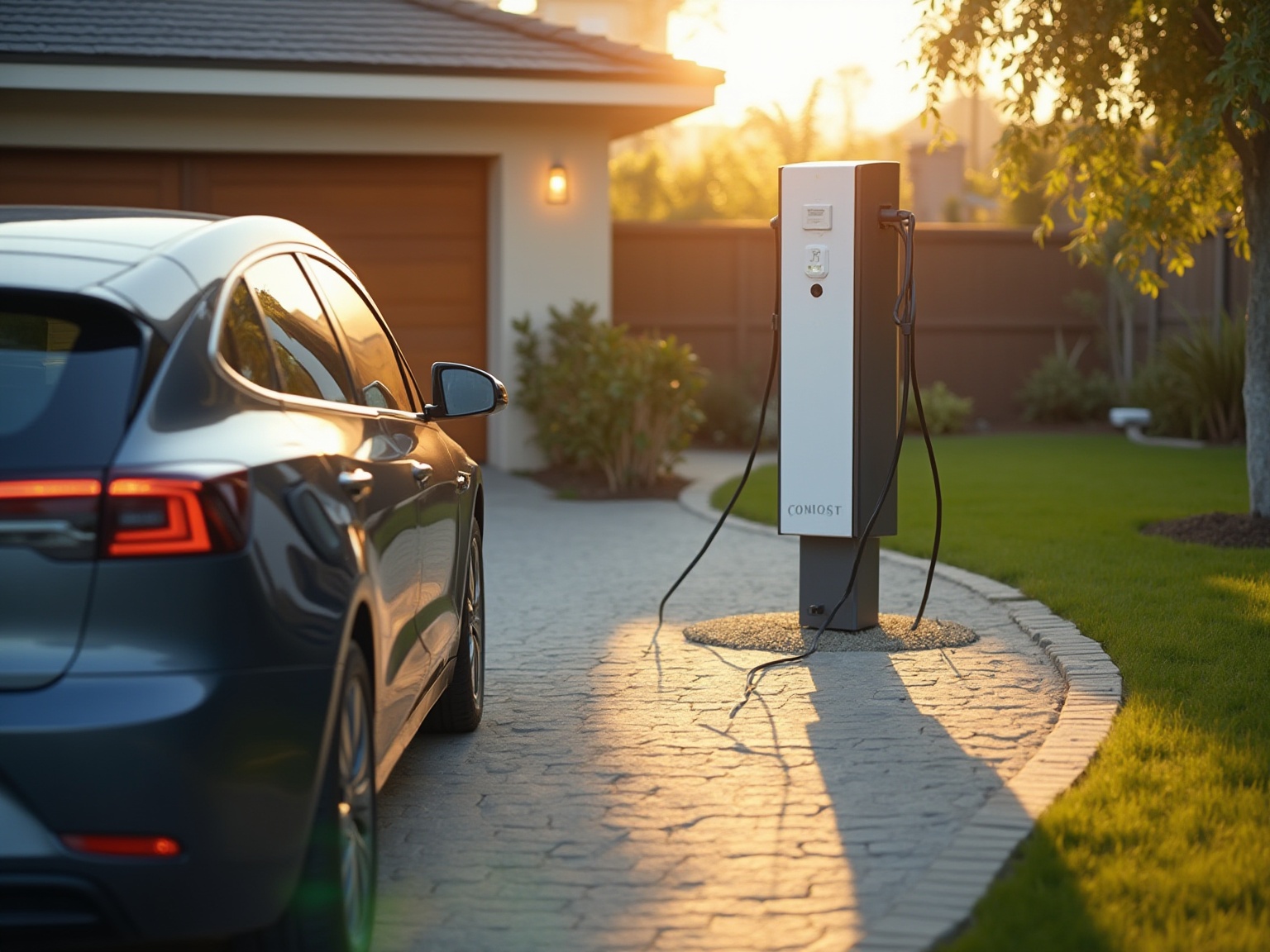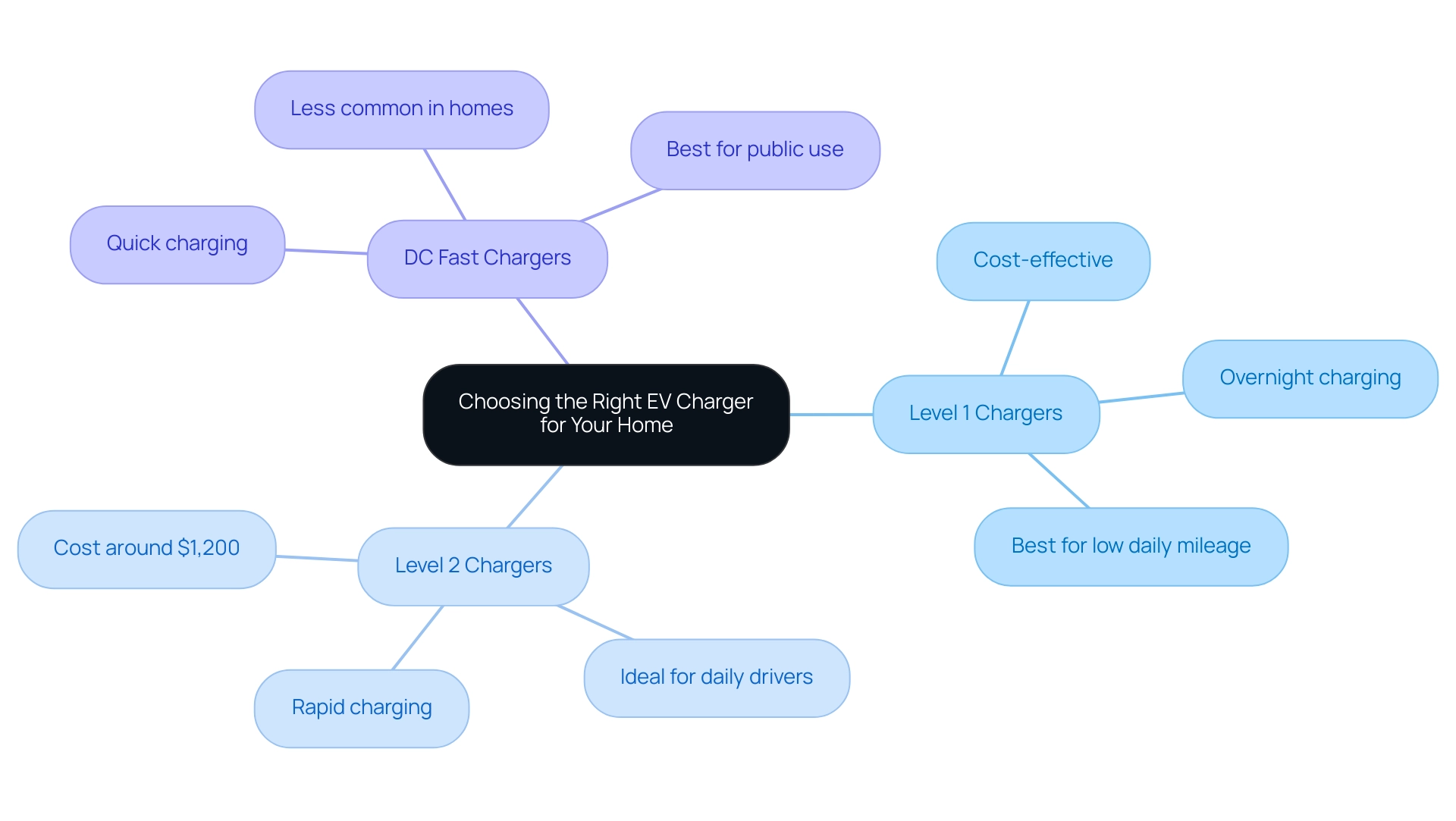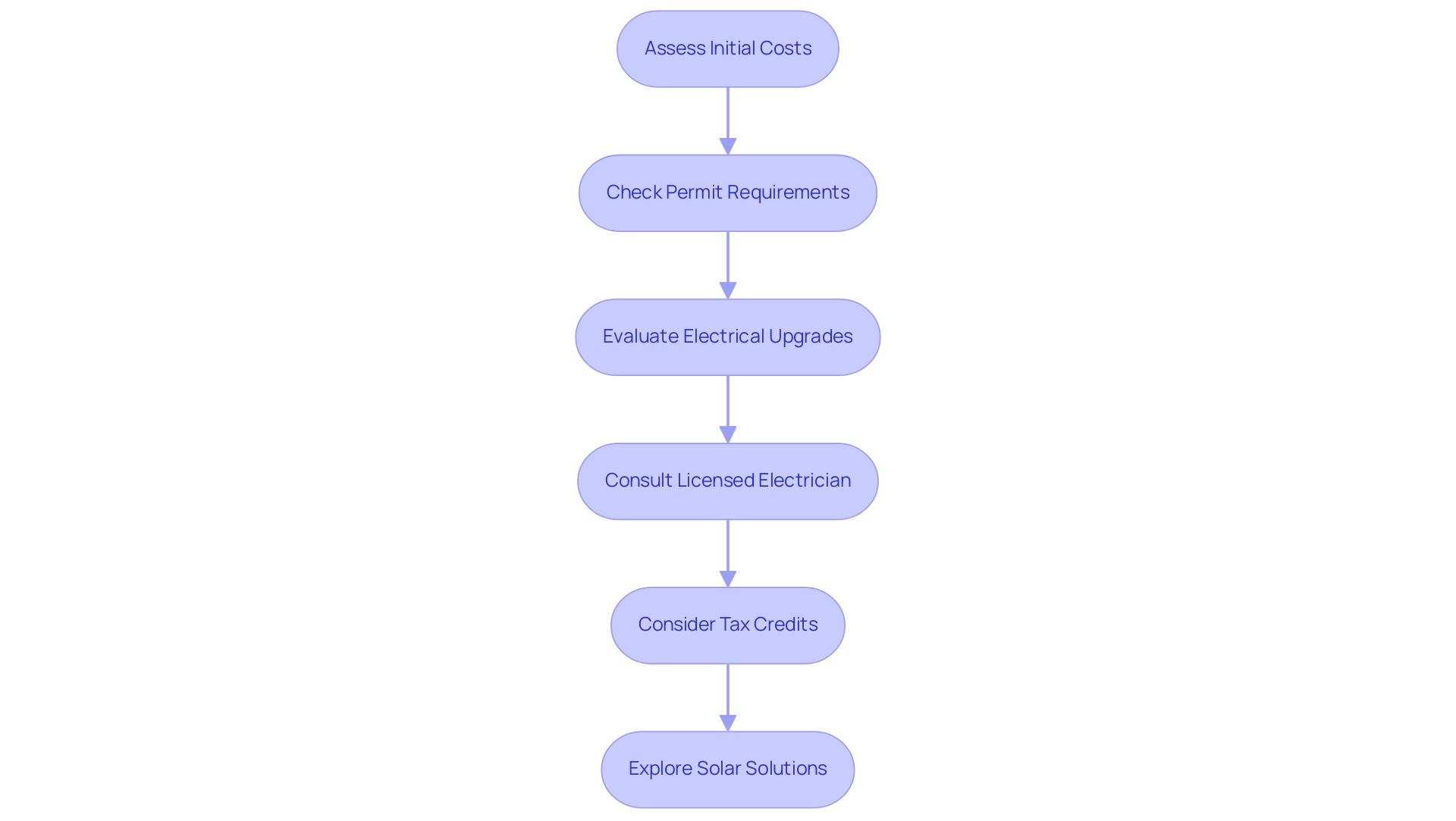Overview
We understand that as homeowners, concerns about rising energy bills can feel overwhelming. The thought of installing electric vehicle (EV) charging stations might seem daunting, especially with upfront costs ranging from $1,200 to $2,500 for Level 2 chargers, which include installation and potential electrical upgrades. However, it’s important to know that there are significant long-term savings and incentives available to help ease this financial burden.
- Federal tax credits
- State rebates
These can make a meaningful difference, promoting not only your energy independence but also a commitment to sustainable energy solutions. Together, we can navigate these options and find the best path forward for your home. Let’s work towards making this transition a rewarding experience that benefits both you and the environment.
Introduction
As we navigate the shift towards sustainable energy solutions, many homeowners are finding themselves drawn to the idea of electric vehicles (EVs). We understand that the transition to electric driving can feel daunting; it’s not solely about purchasing an EV. It also involves grasping the complexities of home charging stations.
From choosing the right type of charger to understanding the costs tied to installation, homeowners encounter numerous decisions that can greatly influence their experience. With options that range from Level 1 chargers, which provide basic convenience, to DC Fast Chargers for those in need of swift power-ups, the choices may seem overwhelming.
Furthermore, hidden costs and available incentives play a vital role in the overall investment required for home charging solutions. This article aims to explore the essential aspects of EV charging stations, guiding homeowners toward informed decisions as we embrace a cleaner, more sustainable future together.
Overview of Electric Vehicle Charging Stations
Electric vehicle refueling stations are essential for homeowners who wish to conveniently power their EVs at home. At Powercore Electric, we specialize in the installation of EV charging stations, ensuring a seamless process that encompasses a thorough site assessment, necessary electrical upgrades, proper installation, and rigorous testing to guarantee optimal functionality. As we look ahead to 2025, it’s important to consider the three main categories of charging devices: Level 1, Level 2, and DC Fast Charging.
Level 1 equipment utilizes a standard household outlet and represents the most basic option, typically requiring between 8 to 20 hours to fully charge an electric vehicle. This makes it suitable for those with lower daily mileage. On the other hand, Level 2 devices necessitate a dedicated 240V outlet, significantly enhancing power delivery efficiency and reducing the charging time to approximately 3 to 8 hours for a complete recharge—an ideal choice for most homeowners. For those who require quicker turnaround times, DC Fast Chargers are available, primarily in commercial settings, and can charge an EV to 80% in roughly 30 minutes.
With the current U.S. EV per charging point ratio standing at 18.2 EV, the demand for home charging solutions is increasingly clear. We understand how vital it is for homeowners to evaluate their driving habits and daily usage patterns to determine which charger type aligns best with their needs. It’s also important to consider the cost of electric vehicle charging stations to ensure a smooth transition to electric driving. If you have questions or would like to schedule an installation, please reach out to Powercore Electric at (916) 699-8778 or via email at ryan.serrano@powercoreinc.net.
Additionally, the Station Locator offers reliable information on available power stations, verifying operational stations at least once a year. This reliability is crucial, especially as global trends, such as the 30% increase in publicly available points in Europe in 2021, highlight the growing importance of EV infrastructure. Together, we can explore the possibilities of establishing power stations at home, making a meaningful impact on your energy independence.
Types of EV Chargers: Choosing the Right One for Your Home
Homeowners looking to install an EV charging station often find themselves considering three primary options: Level 1, Level 2, and DC Fast Charging. Level 1 devices, which connect to standard household outlets, are particularly suitable for those who can charge their vehicles overnight and have limited daily driving needs. This option is especially appealing for individuals with an average driving distance of 30 miles or less per day, a scenario that resonates with many California homeowners.
In fact, with over 80% of EV drivers preferring to charge at home overnight, Level 1 solutions cater to those who prioritize convenience and cost-effectiveness. Conversely, Level 2 devices provide a significantly quicker power solution, ideal for daily drivers who require more effective energy replenishment—often replenishing an EV in just a few hours. For those who may need to charge quickly while on the go, DC Fast Chargers offer rapid power capabilities, though they are generally less common in residential settings and more suited for public stations.
When selecting an EV power source, it’s essential for homeowners to consider their unique driving habits, the current electrical capacity in their homes, and the potential need for future-proofing their solutions as the EV landscape continues to evolve. Moreover, understanding issues such as ‘range anxiety’—which affects numerous homeowners contemplating an EV—can significantly influence their decision-making process regarding charging options. With the popularity of electric vehicles on the rise, as evidenced by EVs making up over 10% of new automobile sales in California, having a robust residential power solution becomes increasingly vital.
Powercore Electric is here to support you with a variety of EV fueling solutions. The electric vehicle charging station cost for Level 2 chargers is competitively priced at around $1,200 installed, ensuring you find the right fit for your needs. Our satisfied customers have reported notable savings on their energy bills and peace of mind from our reliable installations. Are you ready to embrace the switch to electric vehicles?
Contact Powercore Electric today to learn more about our EV charging solutions, including solar panels and battery backups, and discover how we can help you work towards a cleaner, more sustainable future. For more information, call us at (916) 699-8778 or visit us at 1514 Adora Circle, Roseville, CA 95678.
Understanding the Costs of Home EV Charging Stations
In 2025, many homeowners are understandably concerned about the costs associated with transitioning to electric vehicle ownership. The typical cost for a Tesla charging device ranges from $400 to $700, influenced by brand reputation and specific features. However, it’s essential to recognize that the overall costs extend beyond just the purchase price of the charging device. Setup expenses can vary significantly, typically lying between $800 and $2,500, due to necessary electrical upgrades, labor costs, and the complexity of the installation.
We understand that labor costs generally range from $100 to $350, which can add to the financial considerations. Eco-conscious homeowners must take into account both the electric vehicle charging station cost and the installation expenses to fully grasp the financial implications of integrating a residential EV power solution. For instance, charging 100 miles in a vehicle with a 79.7-kWh battery costs approximately $4.45, in stark contrast to $10.96 for a 28-mpg compact crossover at the average U.S. gasoline price. This comparison highlights the potential savings and benefits of making the switch.
This comprehensive analysis aims to ensure that you are well-prepared for the total investment required for a seamless transition to electric vehicle ownership, particularly considering the electric vehicle charging station cost. Additionally, Powercore Electric is here to support you with a variety of services, including solar panels, battery backups, and solar-powered heating solutions to enhance your home’s energy efficiency. Together, we can explore how these solutions not only reduce your energy bills but also contribute to a sustainable future.
Moreover, you may benefit from government programs that provide incentives for installing EV charging stations and solar energy systems, making this transition even more accessible. As Voelcker wisely advises, ‘Always ask before plugging in!’ This underscores the importance of understanding charging practices and the numerous benefits of solar energy solutions. Let’s work towards a more energy-independent future together.
Hidden Costs of Installing EV Charging Stations
As a homeowner, you may find yourself concerned about the costs associated with electric vehicle charging stations. It’s important to consider not only the initial investment for purchasing and installing the station but also the hidden costs that can arise. For instance, local municipalities often require necessary permits to ensure compliance with setup regulations. In California alone, statistics show that approximately 70% of EV charging installations necessitate some form of permit, which can add to the overall cost of your electric vehicle charging station.
Additionally, many homeowners might need to upgrade their electrical panels or wiring to accommodate the new charger. This unexpected expense can catch you off guard. However, it’s worth noting that charging your electric vehicle at home is more manageable than you might think, offering both convenience and potential cost savings. To help alleviate some of these costs, Powercore Electric provides tailored solar solutions designed to combat rising energy expenses while enhancing your home’s sustainability.
Experts emphasize the importance of consulting with a licensed electrician to evaluate potential upgrades and ensure compliance with all requirements. This proactive approach can help you avoid unexpected financial burdens during the installation process. Moreover, don’t overlook the federal tax credit, which covers 30% of hardware and setup expenses, up to $1,000. This can significantly reduce the overall cost of your electric vehicle charging station. As highlighted by Qmerit, the largest EV station setup network in North America, “With over 450,000 EV power points established, our team is here to assist you in managing all your energy transition requirements.”
This underscores the value of professional guidance in navigating both the visible and hidden costs associated with electric vehicle charging station installations. Furthermore, integrating solar panels or battery storage from Powercore Electric to power your station can lower long-term expenses and enhance project profitability, presenting a sustainable option for eco-conscious homeowners. Together, we can work towards a greener future. For more information or to schedule a consultation, please reach out to Powercore Electric at ryan.serrano@powercoreinc.net or call T: (916) 699-8778.
Long-Term Cost Analysis: Home Charging vs. Public Charging
Powering an electric vehicle (EV) at home often proves to be a more cost-effective choice compared to using public refueling stations. This is particularly true for environmentally conscious homeowners who are seeking sustainable solutions. We understand that energy bills can be a concern, and property owners typically face an average expense of around $0.17 per kWh for residential power. For individuals traveling approximately 1,250 miles, this translates to a monthly cost of about $70.72. In contrast, public power rates can vary significantly, especially for DC Fast Power, which tends to be pricier.
This difference underscores the potential for substantial savings on fuel expenses over time when opting for residential power supply. Organizations like Kerbo Charge are dedicated to making electric vehicle refueling more accessible, especially for those without driveways. They collaborate with local councils and global partners to enhance the benefits of residential refueling. As Antuan Goodwin, CNET’s auto and EV specialist, wisely notes,
- ‘Utilizing off-peak electricity usage at your residence if possible,
- benefiting from complimentary EV power at work or during shopping,
- and optimizing local incentives are excellent starting points.’
While the initial investment in a residential power station may seem significant, the long-term financial benefits associated with electric vehicle charging stations make it a worthwhile option for many EV owners. Powercore Electric specializes in the installation of reliable EV power stations and solar panel systems, ensuring that homeowners can maximize their savings while contributing to a more sustainable energy ecosystem. By choosing residential power solutions and utilizing Powercore Electric’s innovative energy options, property owners not only reduce their energy expenses but also support a community-centered approach to renewable energy. Together, we can embrace solar panels and battery backups, setting ourselves apart in the market.
So, as you reflect on your energy habits, consider the advantages of making the switch to residential power. It’s common to feel hesitant about the upfront costs, but remember that the enduring financial advantages can lead to a more sustainable and independent energy future. Let’s work towards a greener tomorrow, ensuring that you feel supported every step of the way.
Exploring Incentives and Rebates for EV Charging Installation
As a homeowner, you may be feeling the weight of rising energy costs, especially when considering the installation of an electric vehicle charging station. The good news is that you can significantly reduce these expenses through a variety of state and federal incentives designed to support your journey towards sustainability. Notably, the Federal EV Tax Credit offers a generous 30% tax credit on the costs associated with acquiring and setting up a home charging station, with a maximum benefit of $1,000. In California, many utility firms are stepping up to assist this transition by providing rebates specifically aimed at reducing the costs of Level 2 charging point setups, further alleviating financial pressures.
For instance, while Alameda Municipal Power’s rebates are well-known for new heat pump HVAC systems, they also extend to EV charging setups. This demonstrates California’s commitment to promoting energy-efficient solutions that benefit you and the environment. It’s essential to thoroughly research the available programs to optimize your savings, especially concerning the costs of electric vehicle charging stations. At Powercore Electric, we are not just your service provider; we are your reliable partner in navigating these incentives and ensuring a smooth setup.
According to Qmerit, a leading electrification partner,
As North America’s most trusted and largest network of certified EV charger installers, Qmerit is recommended by automakers, EV charger manufacturers, utilities, businesses, and homeowners alike.
This highlights the importance of choosing certified professionals for your installation, like those at Powercore Electric, to enhance safety and efficiency while ensuring you remain eligible for valuable rebates. Furthermore, California’s Advanced Clean Cars II Regulation outlines the legal framework for the state’s transition to zero-emission vehicles, reinforcing the necessity and benefits of investing in EV charging infrastructure.
If you’re curious about how we can assist you further, whether it’s with solar panels, battery backups, or general electrical services, please don’t hesitate to reach out to us at Powercore Electric. You can contact us via email at ryan.serrano@powercoreinc.net or by phone at (916) 699-8778. Together, we can work towards a more sustainable future.
Conclusion
Transitioning to electric vehicles and installing home charging stations represent a significant step towards sustainable energy solutions for homeowners. We understand that many are concerned about rising energy bills, and knowing the different types of chargers—Level 1, Level 2, and DC Fast Charging—can empower you to choose the most suitable option based on your driving habits and daily needs. Each charger type offers distinct advantages, from the cost-effective Level 1 option for low-mileage drivers to the more efficient Level 2 chargers for those who require quicker power replenishment.
Moreover, navigating the costs associated with EV charging stations extends beyond the initial purchase. It’s common to feel overwhelmed by installation expenses, potential hidden costs, and the availability of incentives that can significantly mitigate these financial burdens. By leveraging federal tax credits and local rebates, you can make informed decisions that enhance your transition to electric driving while optimizing your investment.
Ultimately, embracing home charging solutions not only leads to considerable savings over time but also supports a broader commitment to sustainable energy practices. As the demand for electric vehicles continues to rise, having a reliable home charging system becomes increasingly essential. Together, we can ensure that you have the support you need in this journey. Powercore Electric stands ready to assist homeowners, providing expert installation services and guidance on maximizing savings through innovative energy solutions. By taking these steps, you can contribute to a cleaner, more sustainable future while enjoying the benefits of electric vehicle ownership.




